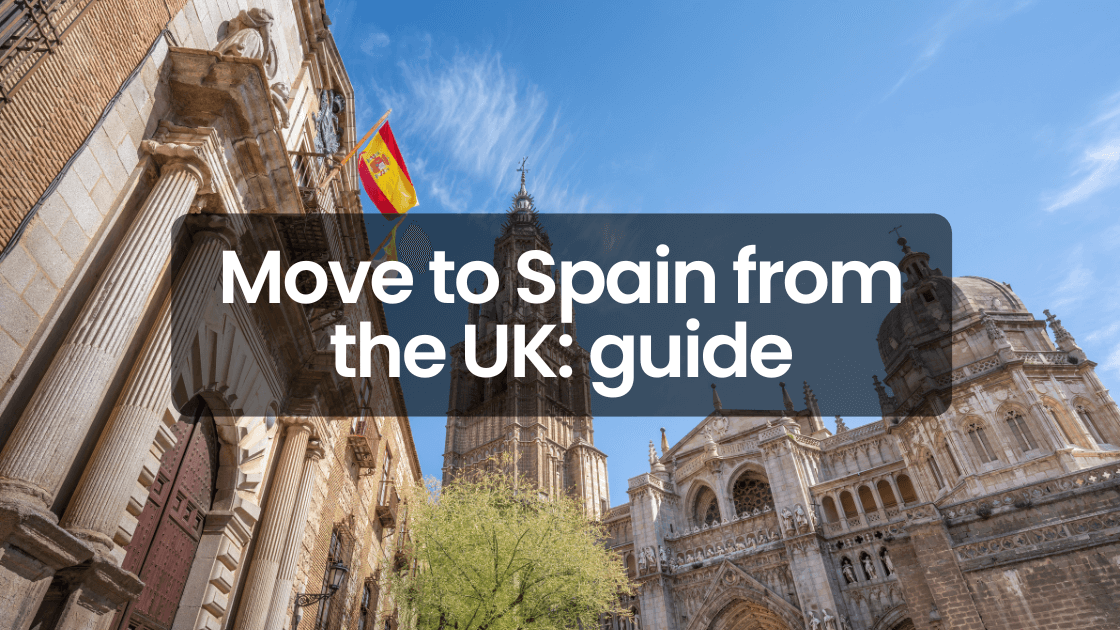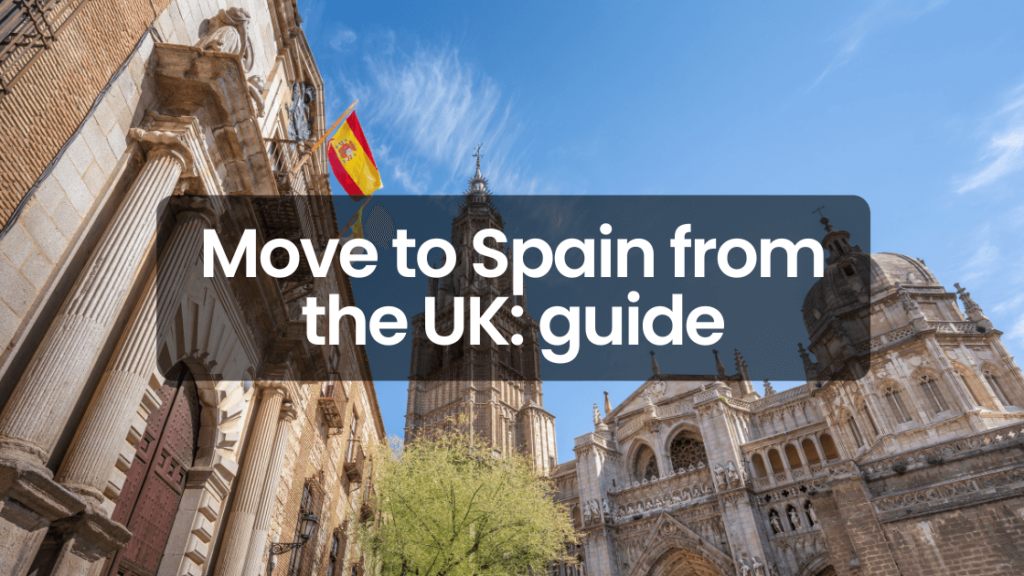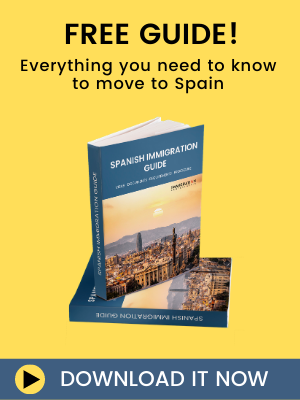
Sun nearly 365 days a year, delicious food, a rich culture and a vibing atmosphere. This, among others, is what convinces every single year hundreds of UK nationals to move to Spain.
But, how does the process work exactly for them? What should you keep in mind in order to enjoy an effortless and smooth migration journey?
In this article, you will find all those answers. Get ready for a complete guide on how to easily move to Spain from the UK. From visas and residency, to work, cost of living, and more.
Content
ToggleHow to move to Spain from UK?
Understanding how to move to Spain is synonymous with understanding what are your visa and residency options.
And while the Spanish immigration law offers tens of options for UK nationals, next, we have summarized the residence permits that are nowadays becoming the most common paths among them:
Non-lucrative visa
If you have sufficient economic means and are not planning to work in Spain, the non-lucrative visa is for sure your option.
Due to its simple requirements, many UK nationals, especially those wishing to retire in the country, use it as their go-to option for moving to Spain.
In order to obtain this 1-year visa (which can be renewed for an extra 2 years and then again 2 years), you must make sure to:
- Demonstrate the possession of sufficient economic means in your bank account (over 28.800€)
- Hire private health insurance without copayments
Digital nomad visa
Since its launch, the digital nomad visa has become one of the most used paths when moving to Spain from all over the world.
As long as you have clients abroad as a freelancer, or your company (not based in Spain) allows you to work remotely, the digital nomad visa can be a great alternative.
To qualify for Spain’s Digital Nomad Visa, applicants must work remotely for a non-Spanish company or earn less than 20% of their income from Spanish sources, demonstrate a stable monthly income of at least €2,600 or sufficient savings, and hold a university degree or three years of professional experience along with full private health insurance in Spain
Student visa
The student visa is always a great option, as it is many times the entry door to stay in Spain long-term.
No matter if you are going to enroll in a Spanish language course, a university degree, or a master’s, you can obtain a student visa in the country.
And, in case you start higher education studies, the advantages abound:
- You can apply for the student visa directly from Spain as a tourist
- After finishing your studies, you can move to a work permit without exiting the country
- You can work up to 30 hours per week with your student visa
Highly qualified work permit
If you have higher education and receive a job offer in a qualified or managerial position, the highly qualified visa eliminates many of the headaches present in a regular work permit.
It offers a fast-track application where in just 20 labor days you will obtain a 3-year residency card that allows you to work for a company in Spain.
To qualify for spain’s highly qualified worker permit, applicants must hold a university degree or equivalent professional experience, have a job offer from a Spanish company in a managerial, technical, or specialized position, and earn a salary above the legal threshold set for highly qualified professionals (generally around €40,000 per year).
Moving to Spain from UK for Work
Let’s now dive deeper into your residency and legal pathways in case you are moving to Spain from the UK for work-related reasons.
We will divide this topic into 2 main categories: those moving with a job offer from a company (which will always be required as an initial step for the employee path), and those who are freelancers or self-employed.
But before moving into this topic, bear in mind that in case you are in the first group and come due to a job offer (and have not been in Spain for the past 5 years), you can benefit from the great tax adavantages of the Beckham Law, thanks to which you will just pay a flat 24% fee on your taxes (instead of paying a progresive tax rate that can reach up to 48%).
Employed by a company
If you are going to be employed by a company, here are your main residency options when moving from the UK:
- Regular work permit. This option is one of the last recommended, as in order to qualify, your job position must be within a shortage occupation list of positions that are difficult to meet by Spanish nationals, which means you will hardly find a valid one.
- Highly qualified visa. Mentioned above, this is the right option for those holding a technical position (like software engineers, architects, etc.) or those managing a team of people.
- Intra-corporate transfer visa. This option is the valid one for foreigners working for a company in the UK (or any other country) who are moved to the Spanish headquarters.
- Internship residency. If you are about to start a 1 or 2-year internship program with a Spanish company, this is your go-to option.
No matter the path or residency option you choose, remember that the hiring company will always start the process. They will have to demonstrate they are free from debts from the Tax Agency and Social Security, and start the process from Spain. Hence, finding a valid job offer is always the first step.
Self-employed
For the brave ones who decide to start their own journey in Spain as freelancers or self-employed individuals, here are their main options:
- Digital nomad visa, for remote workers who have clients abroad (they work as contractors), or those whose company allows them to work remotely from Spain.
- Entrepreneur visa. In case you wish to start your own company in Spain, the entrepreneur visa is your option as long as that business idea is fully innovative (does not exist yet in the market) and involves a high level of technology.
- Self-employed visa. If you want to start offering services on your own but your business is not innovative, the self-employed visa can be your option as long as you create a strong and solid business plan.
In all cases above you will have to demonstrate sufficient funds to sustain yourself (and in many cases your company) in Spain.
Moving to Spain from UK as a student
In case you’d like to move to Spain to study for longer than 90 days, then you must apply for a student visa.
This permit’s duration will be equal to the duration of your studies, and can be applied for directly from Spain as a tourist only if you start higher education or health-related studies.
As for its requirements, you will have to:
- Demonstrate the possession of sufficient funds (600€ per month)
- Show accommodation
- Clean criminal record (for stays exceeding six months)
Again, remember that for higher education studies, you will be allowed to work up to 30 hours per week, and once you finish your studies, move to a highly qualified visa, self-employed vis,a or even looking for a job residency to find a job offer.
How is moving to Spain after Brexit?
Certainly, before the UK’s exit from the EU, things were much easier for UK nationals.
Basically, they could move to Spain simply by obtaining what’s called an EU registration certificate (also known as a green card), which allows them to live and work in Spain and can be obtained much faster.
Hence, UK nationals must now go through the many times tedious process of applying for a residence permit as non-EU citizens, which entails a longer list of requirements and a process that can last between 3 to 6 months.
The different options available are those we have already explored before in this article.
What is the cost of living in Spain?
Living in Spain is often much more affordable than in the UK, which is one of the main reasons so many British citizens decide to relocate.
While the total cost will depend on your lifestyle and the city you choose, Spain offers a great balance between quality of life and expenses.
In general, the average cost of living in Spain ranges from €1,200 to €1,800 per month for a single person, including rent, food, and transportation. Big cities like Madrid or Barcelona are usually more expensive, while smaller towns or coastal areas can be significantly cheaper.
A one-bedroom apartment in the city center can cost around €900 to €1,200, while outside the center, you can easily find options for €600 to €800.
Utility bills (electricity, water, and internet) usually add €100 to €150 per month.
Groceries are relatively cheap compared to the UK. A weekly supermarket bill for one person rarely exceeds €50 to €70, and eating out at local restaurants is very affordable; a full lunch menu costs around €15 to €20..
Public transport is efficient and inexpensive: monthly passes cost between €40 and €60, depending on the city. And if you live in a smaller town, you might not even need one.
Overall, Spain offers a high quality of life at a lower cost, with great healthcare, affordable housing, and a relaxed lifestyle that attracts thousands of expats every year.
Procedure to move to Spain
Moving to Spain from the UK may seem complex at first, but with the right preparation, the process can be straightforward. Below you’ll find the main steps you should follow to ensure a smooth relocation.
Choose the right visa or residence permit
Before anything else, decide which visa best fits your situation. Whether it’s the non-lucrative visa, digital nomad visa, student visa, or highly qualified permit, each option has specific requirements and benefits. Choosing the right one will define your path to legal residence in Spain.
Gather all required documents
Once you know your visa type, prepare the full list of documents. This usually includes a valid passport, proof of sufficient financial means, private health insurance, a clean criminal record certificate, and a medical certificate if required. Make sure all foreign documents are translated into Spanish and legalized with the Apostille of The Hague.
Submit your visa application
You must apply for your visa at the Spanish Consulate in the UK or, in some cases (like student or digital nomad visas), directly from Spain. The processing time can range from a few weeks to a couple of months, depending on the visa type and consulate workload.
Travel to Spain and obtain your residence card (TIE)
Once your visa is approved, you’ll have 90 days to enter Spain. After arrival, you must apply for your residence card (TIE) at the local immigration office or police station within the first 30 days. This card officially proves your legal residence in Spain.
Register your address (empadronamiento)
Next, visit your local Town Hall (Ayuntamiento) to register your address. The “padrón” certificate will be essential for future procedures such as healthcare registration, schooling, or vehicle registration.
Set up your essentials
Once you’re settled, take care of the basics: open a Spanish bank account, register for healthcare (public or private), and get a local SIM card. If you plan to work, make sure you also obtain your NIE and Social Security number.
Enjoy your new life in Spain
With your documents ready and legal status secured, it’s time to enjoy everything Spain has to offer — the weather, the food, and the lifestyle. Adjusting to Spanish culture is usually easy for British expats, and you’ll quickly feel at home.
Get in touch with our lawyers and let us guide you step by step:





